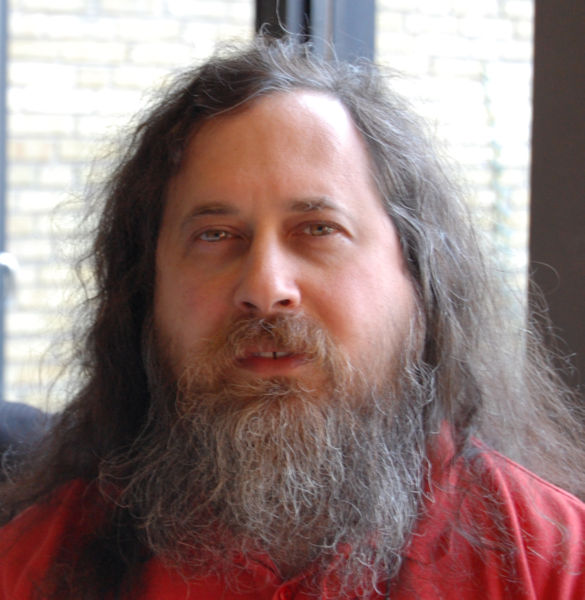UK speaking dates for rms
JH writes to the Hacktionlab list:
Richard Stallman is doing 5 talks at various locations around the country in early March. It seems his main current activity is around raising awareness against anti-downloading legislation, corporations imposing Digital Rights Management and cracking down on copyright infringements – so it’s not the standard rant from him about free software. For this tour I attempted to set up some dates where he could speak in social centres and attract the sorts who might engage in activism around these topics – which is what he wants – but the people organising/paying for the tour didn’t see it that way, and have kept it to campus lecture theatres. As it is I think they are tense because pre-registration numbers are lowish. All events are free (obviously) and you’re absolutely forbidden from networking these dates through Facebook!
For details of the rest of the tour see http://www.theiet.org/local/emea/europe/richard-stallman.cfm

The UK talks are listed below.
CAMBRIDGE – 1st March, 6pm – starting 6.30pm
Free Software and Your Freedom
The Free Software Movement campaigns for computer users’ freedom to cooperate and control their own computing. The Free Software Movement developed the GNU operating system, typically used together with the kernel Linux, specifically to make these freedoms possible.
Venue: Cambridge University Computer Laboratory (CUCL), William Gates Building, 15 JJ Thomson Avenue, Cambridge CB3 0FD (Directions here)
PRESTON – 2nd March – reception 5.30pm, lecture 6.30pm
A Free Digital Society
Activities directed at “including” more people in the use of digital technology are predicated on the assumption that such inclusion is invariably a good thing. It appears so, when judged solely by immediate practical convenience. However, if we also judge in terms of human rights, whether digital inclusion is good or bad depends on what kind of digital world we are to be included in. If we wish to work towards digital inclusion as a goal, it behoves us to make sure it is the good kind. The lecture will also cover hot topics, such as the impact of recent projects such as Wikileaks, on the global digital world and wider audiences.
Venue: Darwin Lecture Theatre, UCLan, Preston (Directions here – PDF)
Registration is mandatory – see here.
SHEFFIELD – 5th March 9.45am-1pm
Copyright vs. Community in the Age of Computer Networks
Copyright developed in the age of the printing press and was designed to fit with the system of centralized copying imposed by this technology. But, the copyright system does not fit well with computer networks, and only Draconian punishments can enforce it. The global corporations that profit from copyright are lobbying for Draconian punishments, and to increase their copyright powers, while suppressing public access to technology. But if we seriously hope to serve the only legitimate purpose of copyright, to promote progress for the benefit of the public, then we must make changes in the other direction.
Venue: University of Sheffield Auditorium, Sheffield University Union of Students, Western Bank, Sheffield, S10 2TN (map).
LONDON – March 7th 5.30pm-9.30pm
A Free Digital Society
Activities directed at “including” more people in the use of digital technology are predicated on the assumption that such inclusion is invariably a good thing. It appears so, when judged solely by immediate practical convenience. However, if we also judge in terms of human rights, whether digital inclusion is good or bad depends on what kind of digital world we are to be included in. If we wish to work towards digital inclusion as a goal, it behoves us to make sure it is the good kind.
Venue: Savoy Place, London (directions here)
BRIGHTON – March 8th, 7pm
Copyright vs. Community in the Age of Computer Networks
Copyright developed in the age of the printing press, and was designed to fit with the system of centralized copying imposed by the printing press. But the copyright system does not fit well with computer networks, and only draconian punishments can enforce it. The global corporations that profit from copyright are lobbying for draconian punishments, and to increase their copyright powers, while suppressing public access to technology. But if we seriously hope to serve the only legitimate purpose of copyright – to promote progress, for the benefit of the public – then we must make changes in the other direction. This talk will also cover the unjust goals of the Digital Economy Act and what the UK ought to do instead.
Venue: Chichester Lecture Theatre, University of Sussex, Falmer, Brighton BN1 9RH (map)
